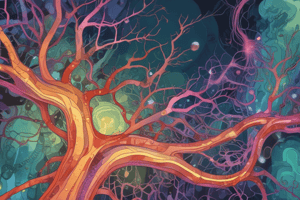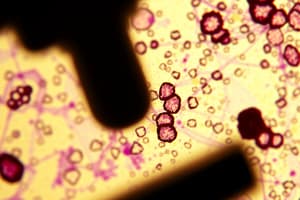Podcast
Questions and Answers
Which type of cell lacks a nucleus and membrane-bound organelles?
Which type of cell lacks a nucleus and membrane-bound organelles?
- Eukaryotic cell
- Mitochondrial cell
- Prokaryotic cell (correct)
- Endoplasmic reticulum cell
What is the basic unit of all living organisms?
What is the basic unit of all living organisms?
- Tissues
- Organs
- Organ systems
- Cells (correct)
Which organelle is responsible for energy production in a cell?
Which organelle is responsible for energy production in a cell?
- Lysosomes
- Endoplasmic reticulum
- Golgi apparatus
- Mitochondria (correct)
Cell division is crucial for which of the following processes?
Cell division is crucial for which of the following processes?
What is the main focus of genetics in biology?
What is the main focus of genetics in biology?
What is the process by which one cell divides into two identical daughter cells called?
What is the process by which one cell divides into two identical daughter cells called?
Which process involves the adaptation of organisms to their environment over time?
Which process involves the adaptation of organisms to their environment over time?
What holds the genetic code in a specific sequence of nucleotide bases?
What holds the genetic code in a specific sequence of nucleotide bases?
How are genetic traits determined?
How are genetic traits determined?
What process can lead to evolution in a population over time?
What process can lead to evolution in a population over time?
Who first introduced the concept of natural selection?
Who first introduced the concept of natural selection?
Which traits can enhance an individual's ability to survive and reproduce according to natural selection?
Which traits can enhance an individual's ability to survive and reproduce according to natural selection?
Study Notes
GCSE Biology
Biology is a fascinating subject with many intricacies and complexities involved in understanding life's fundamental processes. At the secondary school level, students study the fundamentals of this science through a comprehensive curriculum known as GCSE Biology. This article will delve into three main subtopics of GCSE Biology: Cell Biology, Genetics, and Natural Selection.
Cell Biology
Cell biology refers to the study of cells, which are the basic unit of all living organisms. Cells can function independently; however, they often combine to form tissues, organs, and organ systems within multicellular organisms. There are two types of cells: prokaryotic and eukaryotic. Prokaryotic cells lack a nucleus and other membrane-bound organelles, while eukaryotic cells have these features, making them more diverse and complex.
Cell Structure
The structure of cells involves various organelles performing specific functions within the cytoplasm. Some key organelles include the plasma membrane, mitochondria, endoplasmic reticulum, Golgi apparatus, lysosomes, ribosomes, peroxisomes, centrioles, flagella, and cilia. The structural organization of these components helps maintain homeostasis and ensures proper functioning of the cell.
Cell Division
Cell division plays a crucial role in growth, development, tissue repair, and reproduction. It occurs via either binary fission, where one cell divides into two identical daughter cells, or mitosis, where the single nucleus duplicates and separates, followed by the splitting of the cytoplasm to create two separate sets of chromosomal copies. In both cases, each new cell receives an exact copy of the original cell's DNA.
Genetics
Genetics explores how traits are inherited from parents to offspring across generations and how genetic information is encoded within an organism's DNA. The field of genetics has revolutionized our understanding of heredity and its applications reach far beyond biological studies.
Chromosomes and DNA
Chromosomes contain the genetic material responsible for inheriting traits. Humans have 23 pairs of chromosomes, totaling 46 chromosomes, obtained half from each parent. Each chromosome is made up of a long molecule called DNA, which holds the genetic code stored in a specific sequence of nucleotide bases: adenine, cytosine, guanine, and thymine.
Genetic Traits
Genetic traits are characteristics that can be inherited from parents to their offspring. These traits are determined by specific combinations of alleles, alternate forms of genes. For example, a person may have alleles for eye color (one for brown eyes and one for blue eyes), and the combination of these alleles will determine their actual eye color.
Natural Selection
Natural selection is the process by which organisms with certain traits pass these traits on to their offspring, ultimately affecting the frequency of those traits within a population over time. This process can lead to evolution in a population as the traits that confer a survival advantage become more common.
Evolution by Natural Selection
Charles Darwin first introduced the concept of natural selection in his book "On the Origin of Species" in 1859. He proposed that certain variations within a population could provide an advantage for survival and reproduction in specific environments. Over time, these advantageous traits become more common within the population, leading to a shift in the overall genetic makeup of the species.
Evolution and Human Behavior
Natural selection also plays a role in the evolution of human behavior. Traits such as intelligence, cooperation, and empathy can enhance an individual's ability to survive and reproduce, passing these traits on to future generations.
GCSE Biology is a comprehensive curriculum that covers a wide range of topics within the field of biology. The subtopics of cell biology, genetics, and natural selection provide students with a foundation for understanding the complex processes that govern life at the cellular, genetic, and population levels.
Studying That Suits You
Use AI to generate personalized quizzes and flashcards to suit your learning preferences.
Description
Explore the fundamental concepts of GCSE Biology through the subtopics of Cell Biology, Genetics, and Natural Selection. Learn about cell structure, division, chromosomes, DNA, genetic traits, evolution by natural selection, and its impact on human behavior.





